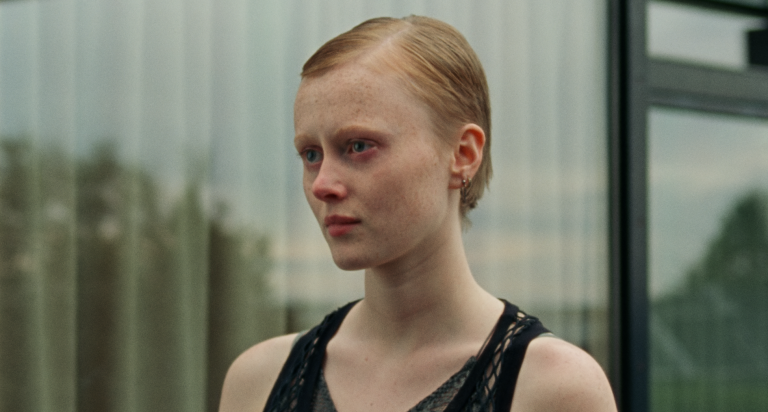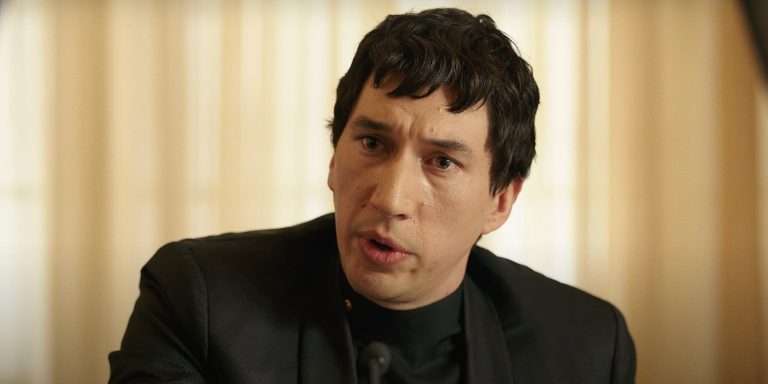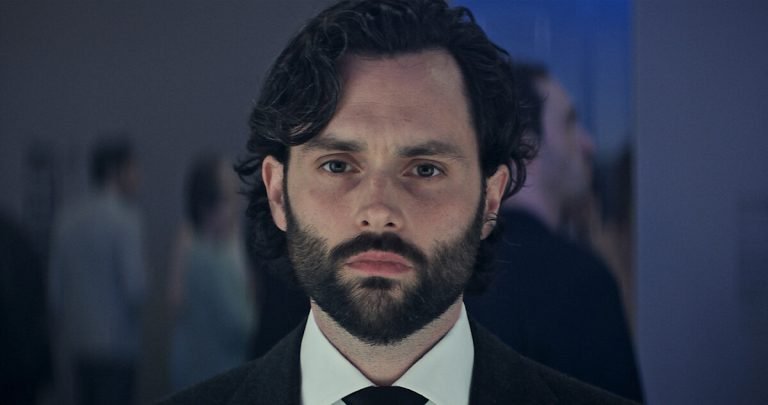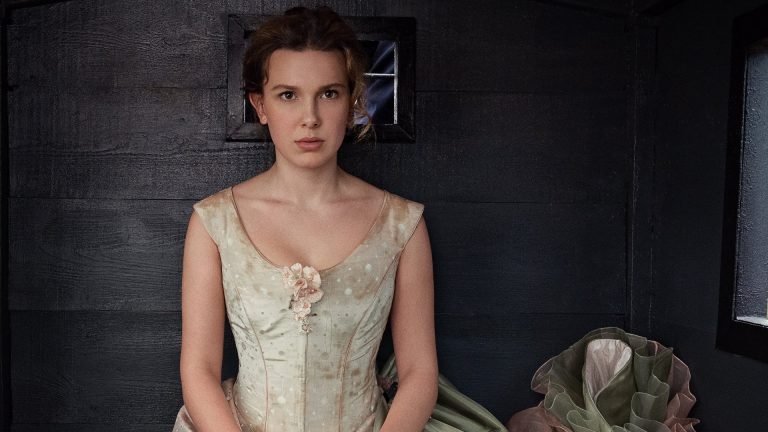Having a good concept is one thing, and selling it is another. Linden Feng and Hannah Palumbo, collectively known as Zhang & Knight, prove with “A Bear Remembers” that execution can elevate even the strangest of ideas. With minimal effort but maximum precision, this short film sells its concept remarkably well. On paper, the premise sounds downright goofy: “A bear starts making sounds, and people get troubled.”
Add to that the even goofier design of the bear itself, who is an intentionally awkward figure with an oddly innocent face, and you might think the film is headed toward parody. But this is where Zhang & Knight manage to turn this absurdity into something quietly profound. A short that could have been a gag becomes a meditation on memory, community, and loss. The team behind the camera is clearly skilled and deeply thoughtful, transforming a potentially silly idea into an emotional and philosophical experience.
A good film, short or feature-length, is one that keeps unfolding as it goes along, and “A Bear Remembers” does exactly that. It doesn’t dump its premise at once. Instead, it layers its mystery carefully, keeping the audience engaged through its structure and tone. The opening feels almost like a mockumentary.
We are introduced to the frustrated citizens of The Grey Hill, a small, picturesque English village that has recently been disturbed by a repetitive, intrusive sound, dun dun dun, resembling two pots clanging together. Initially, the villagers find this noise quirky, maybe even amusing. But as it persists, it becomes unbearable. The sound that once provoked curiosity now inspires irritation. It has grown into a festering boil for the town.
The film begins with these interviews, people venting their annoyance, confusion, and helplessness. It’s an excellent narrative device because it instantly immerses the viewer into the mood of the community. And yet, there’s a layer of intrigue beneath the comedy. Where is the sound coming from? Who or what is making it? And, perhaps most importantly, what does it mean? That’s when we meet Peter (Lewis Cornay), the young and somewhat restless aspiring filmmaker who becomes obsessed with uncovering the mystery.
Peter’s curiosity feels both natural and ironic because, of course, a filmmaker would be drawn to strange sounds and stories. He becomes the vessel through which we explore this odd phenomenon. His motivation goes beyond simple intrigue; it feels as though there’s an almost existential need to find meaning in the chaos.
Peter’s journey takes a turn when he meets Ebba (Anna Calder-Marshall), an old woman who seems to know more than she lets on. Their encounter shifts the story’s gears completely. Now, what started as a small-town mystery has transformed into a reflective odyssey. The film begins to ask deeper questions: Who is the bear? Why is he making this sound? And more symbolically: why has he come back? As Peter and Ebba begin their quiet investigation, “A Bear Remembers” unfolds once again. Its tone remains meditative, yet it gradually becomes philosophical.
The mystery, as it turns out, isn’t about the bear at all; instead, it’s all about memory. About what lingers in a place after joy has left it. The Bear, once thought to be a nuisance, emerges as a sad and lonely figure. He isn’t trying to terrify anyone. As a matter of fact, he’s lamenting. His sounds, those clashing pots, aren’t cries for attention but echoes of a past that no longer exists. He’s mourning the loss of something intangible: the warmth of communal life, the laughter of people gathered together, the joy of simplicity.

The Grey Hill, in all its serene beauty, represents the modern paradox. Normally, a hilly area is associated with peace and tranquility. It is considered a retreat from the chaos of urban life. But here, that calmness feels hollow. The villagers’ silence is now emptiness. Zhang & Knight cleverly invert expectations: the noise that disturbs the town is not an intrusion but a reminder of life that once was. The Bear becomes a metaphorical figure for nostalgia itself; he is the embodiment of the good old days. Most importantly, he is, in essence, the soul of the village, aching for the time when life was less lonely, when community meant something more than shared geography.
Ebba, too, becomes a part of this metaphor. She’s an old relic of that forgotten era, a human embodiment of what the Bear misses. When the two share a moment together, it feels like memory itself is being rekindled. There’s a deeply affecting sequence where Ebba and the Bear dance together. It is a moment that’s both whimsical and heartbreaking.
Around them, they imagine the people who once filled the space. The music, the laughter, the rhythm, they are all echoes now, fading as quickly as they appear. Even as they move, it’s clear they have forgotten some of the steps. But for that fleeting moment, they remember, and that’s enough. It’s in this dance that the film reaches its emotional peak, its heart laid bare in pure cinematic poetry.
Eventually, when the Bear realizes that the world he longed for no longer exists, he retreats. The sounds stop. The village returns to its quiet state. But the question lingers: was there ever true peace to begin with? In a world that has lost its sense of community, where amusement is replaced by apathy, and where people live isolated lives, can silence really be called peace? Zhang & Knight leave us with that haunting thought. The noise that everyone despised might have been the only proof that something alive still lingered in The Grey Hill.
The brilliance of “A Bear Remembers” lies in its ability to evoke emotion through minimalism. Its design choices, like the deliberately awkward bear costume, might appear funny or offbeat at first glance, but they serve the film’s tone. It’s a one-note visual in some ways, yet that simplicity allows the story’s metaphors to breathe.
The film’s muted palette, slow rhythm, and restrained performances blend perfectly to create a sense of melancholic stillness. There’s an undeniable sweetness beneath the absurdity. Despite being rooted in whimsy, “A Bear Remembers” feels grounded in truth. It speaks to that universal longing for the past and for the warmth of connection that seems to be slipping away in modern life. And in that sense, its thematic resonance is far larger than its brief runtime.
Of course, the film isn’t flawless. The tonal consistency occasionally makes it feel too still, too subdued for its own good. The design of the bear, while conceptually sound, can take you out of the moment, for how unintentionally funny it appears. But even with these quirks, or perhaps because of them, “A Bear Remembers” stands out. Its imperfections give it charm, and its sincerity gives it depth.
Winner of the Jury Award for Best Drama at Aspen Shortsfest 2025, as well as the European Film Award and the Canal+ Award International Competition, Zhang & Knight’s short film more than earns its accolades. It’s a quiet, beautiful odyssey where minimalism takes center stage and sincerity triumphs over spectacle.
In the end, “A Bear Remembers” is not just about a bear or a sound. Instead, it’s about what we have collectively forgotten, which is the feeling of togetherness, the joy of small moments, the magic of being seen and remembered. It reminds us that sometimes, even the strangest stories can reflect our most human emotions. Despite its flaws, this short film strikes a chord.






